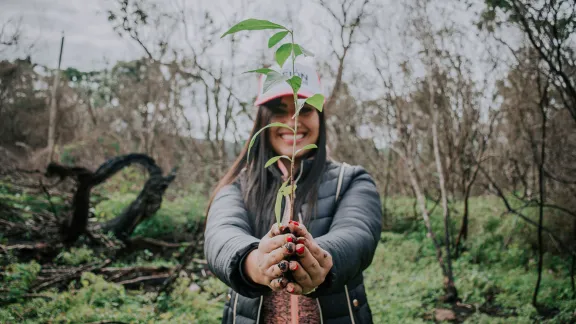
In Argentina’s Misiones Province where the Evangelical Church of the River Plate conducted 310 activities on biodiversity conservation and restoration, 395 hectares of forests have been restored and reforested, including cultivation of fruit and medicinal species. Photo: IERP
Involving churches and country programs in “local to global action”
(LWI) – Renewable energy initiatives in refugee camps, reforestation efforts, protection of river basins and indigenous land. The Lutheran World Federation (LWF) highlights such community-based initiatives in a new report on good practices that address the impact of climate change at the local level.
“It is intended to inspire and serve as a call to action in our collective advocacy for a just and sustainable world. The local initiatives emphasize that climate justice is essential to ensure the well-being of present and future generations,” said Ms Elena Cedillo Vargas, LWF Program Executive for Climate Justice.
The Compilation of Climate Justice Advocacy Good Practices showcases 10 projects led by LWF member churches and country programs in Argentina, Colombia, El Salvador, Ethiopia, Indonesia, Kenya, Palestine and the United States, in collaboration with LWF’s partners. They address key climate actions including adaptation, mitigation, and advocacy. and place emphasis on empowering vulnerable groups, especially women and youth.
The local initiatives emphasize that climate justice is essential to ensure the well-being of present and future generations
Ms Elena Cedillo Vargas, LWF Program Executive for Climate Justice.
One of the projects highlighted is in Colombia’s Arauca region where entire ecosystems had been destroyed, communities displaced, and local labor exploited by oil companies and other extractive industries. LWF’s intervention was key in empowering communities to advocate for their environmental rights and enhance citizen participation. Around 250 local farmers directly benefitted and another 17,000 were indirectly involved in promoting reforestation, land recovery and restoring livelihoods by successfully integrating agroecological techniques in the cultivation of cocoa, plantain, and corn.
Other examples include provision of renewable energy systems and electronic learning devices in refugee camps in Kenya, microclimate insurance for small farmers in El Salvador, and a Lutheran Climate Post to empower youth in Indonesia with knowledge and tools for advocacy.
Unwavering commitment
The report is part of LWF’s “Local to Global Action for Climate Justice” project, which aims to systematize and share exemplary climate initiatives, Cedillo explained. It draws on a robust analysis of 87 community-based initiatives that contribute to long-term climate resilience at the local level and uphold fairness and inclusivity in their implementation.
In the report’s introduction, LWF leaders emphasize the vital role of faith-based organizations (FBOs) in inspiring deeper collaboration with non-governmental organizations, and governments in the global climate justice movement. The report “serves as a repository of exemplary practices that celebrate transformative initiatives and underscore the unwavering commitment of the LWF and its partners to climate justice,” say Department for Theology, Mission and Justice Director Rev. Dr Sivin Kit, and World Service Director Dr Maria Immonen.
Download the report on Climate Justice Advocacy Good Practices and access an interactive format on this website.


